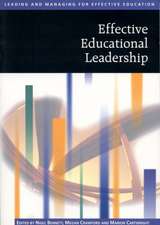When Schools Compete: A Cautionary Tale
Autor Edward B. Fiske, Helen F. Ladden Limba Engleză Paperback – mar 2000
In 1989 New Zealand embarked on what is arguably the most thorough and dramatic transformation of a compulsory state education system ever undertaken by an industrialized country. Under a plan known as Tomorrow's Schools this island nation of 3.8 million people abolished its national Department of Education and turned control of its nearly 2,700 primary and secondary schools over to locally elected boards of trustees. Virtually overnight, one of the world's most tightly controlled public education systems became one of the most decentralized. Two years later, in 1991, with a new government in power, New Zealand enacted further reforms that introduced full parental choice of schools and encouraged the development of a competitive culture in the state education system. Debate rages in the United States about whether similar reforms would improve the performance of the country's troubled public school system. Judgments about the potential benefits of these ideas, as well as the general relevance of economic models to educational systems, tap into deeply held values, and discussion in the U.S. has been hampered by the lack of practical experience with them. The extended and widespread experiences of New Zealand, whose school system functions much like our own, provide U.S. policy makers with a wide range of appropriate insights and implications to consider as they gauge the merits of bold education reform. When Schools Compete is the first book to provide detailed quantitative and qualitative analysis of the New Zealand experiment. Combining the perceptive observations of a prominent education journalist and the analytical skills of an academic policy analyst, this book will help supporters and critics of market-based education reforms better anticipate the potential long-term consequences of applying ideas of market competition to the delivery of education.
Preț: 219.63 lei
Nou
Puncte Express: 329
Preț estimativ în valută:
42.03€ • 43.72$ • 34.70£
42.03€ • 43.72$ • 34.70£
Carte tipărită la comandă
Livrare economică 15-29 aprilie
Preluare comenzi: 021 569.72.76
Specificații
ISBN-13: 9780815728351
ISBN-10: 0815728352
Pagini: 342
Dimensiuni: 152 x 229 x 24 mm
Greutate: 0.48 kg
Ediția:New.
Editura: Brookings Institution Press
Colecția Brookings Institution Press
ISBN-10: 0815728352
Pagini: 342
Dimensiuni: 152 x 229 x 24 mm
Greutate: 0.48 kg
Ediția:New.
Editura: Brookings Institution Press
Colecția Brookings Institution Press
Notă biografică
Descriere
In 1989 New Zealand embarked on what is arguably the most thorough and dramatic transformation of a compulsory state education system ever undertaken by an industrialized country. Under a plan known as Tomorrow's Schools this island nation of 3.8 million people abolished its national Department of Education and turned control of its nearly 2,700 primary and secondary schools over to locally elected boards of trustees. Virtually overnight, one of the world's most tightly controlled public education systems became one of the most decentralized. Two years later, in 1991, with a new government in power, New Zealand enacted further reforms that introduced full parental choice of schools and encouraged the development of a competitive culture in the state education system. Debate rages in the United States about whether similar reforms would improve the performance of the country's troubled public school system. Judgments about the potential benefits of these ideas, as well as the general relevance of economic models to educational systems, tap into deeply held values, and discussion in the U.S. has been hampered by the lack of practical experience with them. The extended and widespread experiences of New Zealand, whose school system functions much like our own, provide U.S. policy makers with a wide range of appropriate insights and implications to consider as they gauge the merits of bold education reform. When Schools Compete is the first book to provide detailed quantitative and qualitative analysis of the New Zealand experiment. Combining the perceptive observations of a prominent education journalist and the analytical skills of an academic policy analyst, this book will help supporters and critics of market-based education reforms better anticipate the potential long-term consequences of applying ideas of market competition to the delivery of education.














